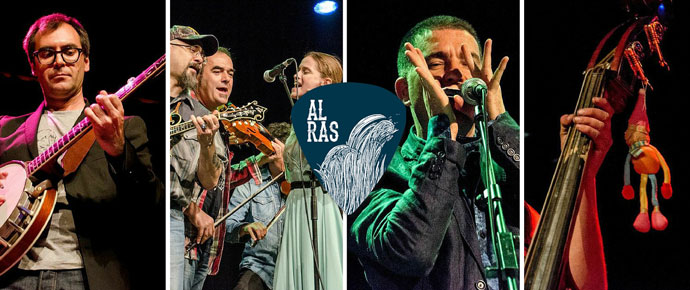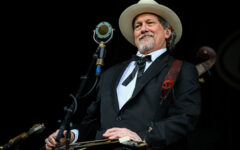
This weekend will see the 17th annual Al Ras Bluegrass & Old Time Festival, hosted in a number of locations in Barcelona. Now the largest and most comprehensive event of its kind in Spain, Al Ras brings performers from all over the country, and all across Europe, to perform for increasingly well-informed music lovers at popular music venues in the city.
The success of the festival has seen a growth of interest in bluegrass in Spain, but it still lags a bit behind other European nations which have active associations and clubs promoting and teaching the music on a regular basis.
To get a feel for the Spanish bluegrass scene, we spoke with Lluis Gomez, a banjo player and teacher who has been working there for many years. He is also deeply involved with the Al Ras Association, which puts on the festival, as well as an annual Barcelona Bluegrass Camp, and a twice-monthly jam there in town.
Lluis says he first learned about the music himself not long before the festival got going, and has seen the bluegrass community expand since then.
“I discovered bluegrass when I was 20 years old, thanks to the album Banjo Paris Session — I think it was around 1992. The first unofficial edition of the Al Ras Festival was in 1999. At that time it was not named Al Ras, but was a BBQ with bluegrass and old-time musicians. This happened for three years, and it served as the seeds of the future Al Ras Festival. So, I think it was around 1995 that I started to be in touch with the small bluegrass scene here, specifically in Barcelona.
Since then, lots of things have changed, especially the learning methods and the increased opportunities to see American bands live. There are also more opportunities to attend workshops, and of course now we have the Internet and YouTube. I remember learning by ear from vinyl. It was difficult to find books back then, and there were no teachers. It was difficult not just to learn banjo, but it was also quite rare to be able to see anyone playing the banjo.
These days you can learn from a DVD, or take lessons from your musical heroes by Skype — so, lots of good changes!
Right now, in my experience here, the new generation has all the tools available to learn, but I think they don’t know how to use them. There is too much information, they jump from a Béla Fleck tune to a Noam Pikelny without a basic understanding of the Scruggs style.”
Gomez is doing his part, offering private instruction for banjo, mandolin, and guitar in Barcelona, and at music camps and workshops across Spain. You can also find him performing in regional music clubs and concert halls in a variety of configurations.
“As a performer, I give a lot of people in Spain the opportunity to see a banjo player perform who is not just playing Oh Susanna. I like to surprise Spanish listeners with tunes like a solo version of What A Wonderful World, or original compositions that are not bluegrass — I was playing in a blues festival a few weeks ago and a well-known guitar player called me the Joe Satriani of banjo, haha!!
I think bluegrass is still less popular here than in other European countries. I’m in contact with the bluegrass associations in the rest of Europe, so I know more or less the scene of every country. But bluegrass is growing in Spain, especially in the last five years. Three new festivals focused on bluegrass and old time music have recently appeared: Rustyc in Getxo (Bilbao), Old Rooster in Almacelles (Lleida), and Nofugrass Fest in Nofuentes (Burgos). In addition, all around Spain there are some great country festivals like Huercasa in Segovia.
The four bluegrass and old time festivals in Spain (Rustyc, Old Rooster, Nofugrass, and Al Ras) bring more and more fans and musicians to this type of music. Another thing I think is related to the new festivals, is that there are lot of great new bands.
In Spain, it’s funny because we have Facebook pages for the different communities but we don’t have an official Spanish Bluegrass and Old Time organization. It’s a shame, but we are all working hard!”
As Gomez sees it, people in Spain don’t recognize a distinction between bluegrass or old time music and American country music in general. And there is still a public association between country music and cowboys that lingers from television and movies.
But when they get an opportunity to hear it performed, they enjoy it right away.
“The reaction is really good, I can see their faces from the stage. I have played bluegrass in blues and jazz festivals all around Spain, and people always like the music, both the vocal tunes and instrumentals. After the concert, people always come up to talk. Many folks will mention what a nice surprise it is to discover this type of music. They buy CDs and ask for more information, and this helps spread the word about bluegrass.”
Well done Lluis! It’s the missionary work of artists like him, and the people behind the Al Ras Festival, that create fertile ground for the music in a culture that’s never heard it, and which has a rich tradition of folk music of its own.
Anyone in or near Barcelona should make an effort to attend Al Ras, if not this year, then sometime in the future.







